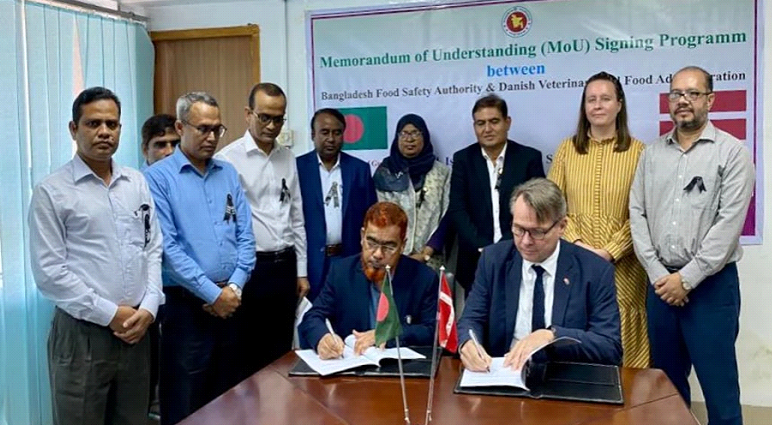By signing an MoU, Bangladesh could gain access to Denmark’s expertise, best practices, and knowledge related to food safety standards, risk assessment, and quality control
The partnership between Bangladesh and Denmark has been solidified, with the aim to strengthen their ties, especially in the domains of food safety and the development of sustainable food production.
Working towards this aim, a memorandum of understanding (MoU) was signed between the Bangladesh Food Safety Authority (BFSA) and the Danish Veterinary and Food Administration (DVFA) yesterday. This agreement was formalized at the food ministry office in Dhaka.
The signing ceremony occurred with the presence of notable figures, including Ismail Hossain ndc, the secretary of the ministry, Abdul Kayowm Sarker, chairman of the Bangladesh Food Safety Authority (BSFA), Anders Karlsen, the Charge d Affaires at the Danish embassy in Dhaka, and Maria Knudsen, Sector Counsellor at the embassy, as stated in a press release.
You can also read: Pillar of the Growing China-Bangladesh Relations: Chinese BRI investments
Denmark and Bangladesh have cultivated a strong and enduring partnership with a shared commitment to fostering collaboration within the food and agricultural domain. This commitment is formally enshrined in the “Sustainable and Green Framework Engagement”, a testament to their dedication to sustainable development and cooperation.
Abdul Kayowm Sarker stated that- “Our goal is to ensure the safety of our food supply, drawing from shared insights and contributing to the global drive for higher food safety standards.”
He expressed confidence that these concerted endeavors will enhance consumer safety and bolster the nation’s standing in the global food market.
Sarker’s assertion underscores the pivotal role of international cooperation in ensuring safer food and sustainable industry growth.

Anders Karlsen also revealed delight over the enduring bond between Denmark and Bangladesh over the past five decades. He eagerly welcomed the opportunity to elevate this relationship through a significant MoU. As a result, this will foster profound cooperation to enhance sustainable and secure food production.
Maria Stein Knudsen emphasized the shared commitment of Bangladesh and Denmark as prominent food-producing nations. Acknowledging the global impacts of safe and nutritious food, she highlighted their joint aim to enhance sustainability in production. She eagerly anticipates collaborative efforts between Denmark, the DVFA, and BFSA to advance food security and promote sustainable practices.
Bangladesh’s potential advantages of signing MoU with Denmark over food safety:
Denmark has a well-established reputation for its strong food safety regulations, systems, and technologies. By signing an MoU, Bangladesh could gain access to Denmark’s expertise, best practices, and knowledge related to food safety standards, risk assessment, and quality control.
First of all, collaborating with Denmark can lead to training programs, workshops, and seminars that focus on various aspects of food safety. These initiatives can help build the capacity of Bangladesh’s food safety authorities, regulatory agencies, and industry stakeholders. This could help improve their understanding of modern food safety management techniques and enhance their ability to ensure safe and high-quality food production.
Second, Denmark has access to cutting-edge technologies and tools related to food safety, monitoring, testing, and traceability. The ability of Denmark to identify risks originating from pathogens and chemicals and to implement potent quality assurance strategies is noteworthy.
Next, Danish food regulations are stringently observed by the EU. By improving food safety practices to align with Danish standards, Bangladesh could position itself to meet the requirements for exporting food to the EU market.
Also, enhanced food safety practices can directly contribute to improved public health. It will reduce the risks of foodborne illnesses, health-related issues, and outbreaks, and in turn, will reduce healthcare costs.
Fourth, it will open doors for joint research and innovation projects in the field of food safety. This could lead to the development of new technologies and methodologies that benefit both countries. Danish farmers and food manufacturers work together to guarantee the quality of raw materials, resulting in a global belief in Danish food goods.
Fifth, strengthening food safety practices can make Bangladesh a more attractive destination for foreign investments in the food sector. It can also contribute to increased trade partnerships with countries that value high food safety standards.
Finally, Denmark has a high strategic plan to develop a carbon-neutral Food system worldwide by 2050. The Sustainable Development Goals (SDGs) serve as a compass, steering the way toward optimal food production practices, emphasizing research and development goals, and directing strategic innovation practices. All these objectives will pave the path to a sustainable tomorrow.


